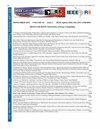Design and Validation of an IoT System for an Experimental Laboratory Microgrid
IF 1.3
4区 工程技术
Q3 COMPUTER SCIENCE, INFORMATION SYSTEMS
引用次数: 0
Abstract
In the energy transition context, electrical microgrids facilitate the integration of renewable generation into the electrical grid, improving the electrical system's reliability and accelerating its decarbonization. However, to promote the technological advancement of these grids, it is necessary to develop tools to validate new technologies and solutions, such as using the Internet of Things (IoT) for their operation and control. This work presents the design, implementation, and validation of an IoT system for an experimental laboratory microgrid developed at Universidad Industrial de Santander. The main design phases of the IoT system are described, beginning with the definition of requirements and extending through the component selection. Validation tests are proposed to verify the functionalities of the IoT system. The results demonstrate that the IoT system successfully enables the transmission and reception of data from external users and servers. The reported experience and the proposed validation tests are relevant for researchers interested in implementing IoT-based stages in existing or future laboratory microgrids.实验室微电网物联网系统的设计与验证
在能源转型背景下,微电网促进了可再生能源发电并入电网,提高了电力系统的可靠性,加速了电力系统的脱碳。然而,为了促进这些电网的技术进步,有必要开发工具来验证新技术和解决方案,例如使用物联网(IoT)进行其操作和控制。这项工作介绍了桑坦德工业大学开发的实验实验室微电网的物联网系统的设计、实施和验证。描述了物联网系统的主要设计阶段,从需求定义开始,扩展到组件选择。提出了验证测试来验证物联网系统的功能。结果表明,物联网系统成功地实现了来自外部用户和服务器的数据传输和接收。报告的经验和提议的验证测试对于有兴趣在现有或未来的实验室微电网中实施基于物联网的阶段的研究人员是相关的。
本文章由计算机程序翻译,如有差异,请以英文原文为准。
求助全文
约1分钟内获得全文
求助全文
来源期刊

IEEE Latin America Transactions
COMPUTER SCIENCE, INFORMATION SYSTEMS-ENGINEERING, ELECTRICAL & ELECTRONIC
CiteScore
3.50
自引率
7.70%
发文量
192
审稿时长
3-8 weeks
期刊介绍:
IEEE Latin America Transactions (IEEE LATAM) is an interdisciplinary journal focused on the dissemination of original and quality research papers / review articles in Spanish and Portuguese of emerging topics in three main areas: Computing, Electric Energy and Electronics. Some of the sub-areas of the journal are, but not limited to: Automatic control, communications, instrumentation, artificial intelligence, power and industrial electronics, fault diagnosis and detection, transportation electrification, internet of things, electrical machines, circuits and systems, biomedicine and biomedical / haptic applications, secure communications, robotics, sensors and actuators, computer networks, smart grids, among others.
 求助内容:
求助内容: 应助结果提醒方式:
应助结果提醒方式:


